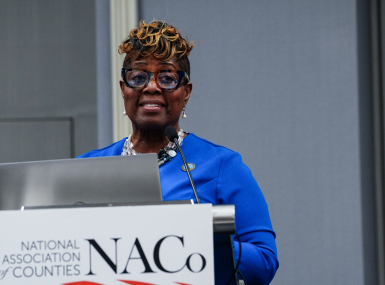Unlock the Power of CJCCs: Responsive Policies Through Community Engagement

This webinar is available on-demand. If you have issue accessing the recording, please email nacomeetings@naco.org.
Active community collaboration is crucial for shaping county operations and policy priorities. Criminal Justice Coordinating Councils (CJCCs) are one approach to ensure that community members are involved in county governance. Many counties form CJCCs to identify systemic challenges and work across stakeholders to guide local policy to improve public safety.
In this webinar, NACo explores how ongoing and consistent community engagement enhances the impact of CJCCs and how these bodies can serve as effective tools for county leaders to actively involve their residents. Learn from real-world examples and discover strategies to create a more responsive and inclusive criminal legal system.
Unlock the Power of Criminal Justice Coordinating Councils is NACo’s series on how counties can develop and leverage CJCCs to more effectively administer and strengthen their criminal legal system. Learn more at NACo’s CJCC Resource Hub.
Watch Recording
Click here to access the recording in a new window.
Speakers

Rose Toehe
Ellen S. Steinberg, JD

Orleny Rojas
Webinar
Unlock the Power of CJCCs: Enhancing Your County's Justice System
Whether you're looking to create a CJCC from scratch or enhance an existing one, discover the invaluable insights needed to make your county's justice system more efficient, fair and just.
Related News

National Association of Counties Launches Initiative to Strengthen County Human Services Systems
The National Association of Counties (NACo) announces the launch of the Transforming Human Services Initiative, a new effort to help counties modernize benefits administration, integrate service delivery systems and strengthen county capacity to fulfill our responsibility as America’s safety net for children and families.

Congress seeking ‘common-sense solutions’ to unmet mental health needs
Rep. Andrea Salinas (D-Ore.): “Right now, it is too difficult to access providers … and get mental health care in a facility that is the right size and also the appropriate acuity level to meet patients’ needs.”

Prince William County transforms crisis care through "No Wrong Door" approach
Prince William County, Va.’s Crisis Receiving Center is bridging the gap between emergency room care and traditional outpatient care in behavioral crisis response and reducing burden on local law enforcement and hospitals.